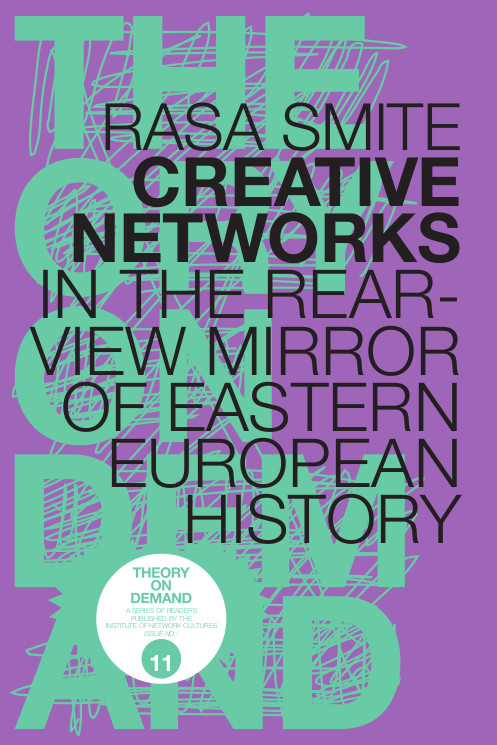Rasa Smite: Creative Networks: In the Rearview Mirror of Eastern European History (2011/2012)
Filed under book | Tags: · actor-network theory, cyberfeminism, eastern europe, internet, internet art, internet culture, latvia, media art, net art, network culture, networks, sound art, virtual communities

“Creative Networks explores the dawn of the Internet culture in the age of network society from the perspective of Eastern Europe. From a theoretical angle the networks are introduced and interpreted as complex socio-technical systems. The author analyzes the development of these networked self-organized formations starting off with ‘virtual communities’ of ‘creative networks’, which emerged during the early phase of the Internet, up to the phenomena of today’s online ‘social networks’. Along with the translocal case studies of Nettime, Syndicate, Faces and Xchange networks (as well as with the other important facets of the 1990s network culture in Europe), the author studies also local community networking case of alternative and digital culture that evolved around E-Lab in the 1990s in Latvia. By focusing primarily on the network culture of 1990s, this study reflects those changes in the social structure of today’s society that are occurring under the process of socio-technical transformation.
The book is based on a dissertation by Rasa Smite, with the title Creative Network Communities and was defended in Riga Stradins University, February 2011.”
First published in Latvian in Riga: RIXC and Liepaja: LiepU MPLab, 2011.
Translated by Linda Vebere
Publisher Institute of Network Cultures, Amsterdam 2012
Creative Commons Attribution Noncommercial No Derivative Works 3.0 Netherlands License
ISBN 9789081857505
160 pages
Review: Piibe Piirma (Baltic Screen Media Review, 2014).
PDF (updated on 2023-9-27)
Comment (0)UNDP: Social Media, Accountability, and Public Transparency in Eastern Europe and CIS (2011)
Filed under report | Tags: · activism, corruption, eastern europe, internet activism, open data, open government, politics, social media, transparency, web 2.0

The domination of the executive over other branches of the government and the media is frequent in Eastern Europe and the Commonwealth of Independent States (CIS), but the rapid development of social media is changing this pattern by transforming personal conversations and individual opinions into a subject of public debate.
Publisher UNDP Bratislava Regional Centre, October 2011
review (Eva Vozárová, Fair-play Alliance)
PDF
View online (Issuu.com)
Gabrielle Hecht (ed.): Entangled Geographies: Empire and Technopolitics in the Global Cold War (2011)
Filed under book | Tags: · cold war, decolonization, eastern europe, geopolitics, politics, technology, technopolitics

“The Cold War was not simply a duel of superpowers. It took place not just in Washington and Moscow but also in the social and political arenas of geographically far-flung countries emerging from colonial rule. Moreover, Cold War tensions were manifest not only in global political disputes but also in struggles over technology. Technological systems and expertise offered a powerful way to shape countries politically, economically, socially, and culturally. Entangled Geographies explores how Cold War politics, imperialism, and postcolonial nation building became entangled in technologies and considers the legacies of those entanglements for today’s globalized world.
The essays address such topics as the islands and atolls taken over for military and technological purposes by the supposedly non-imperial United States, apartheid-era South Africa’s efforts to achieve international legitimacy as a nuclear nation, international technical assistance and Cold War politics, the Saudi irrigation system that spurred a Shi’i rebellion, and the momentary technopolitics of emergency as practiced by Medecins sans Frontières.
The contributors to Entangled Geographies offer insights from the anthropology and history of development, from diplomatic history, and from science and technology studies. The book represents a unique synthesis of these three disciplines, providing new perspectives on the global Cold War.”
Publisher MIT Press, 2011
Inside Technology series
ISBN 0262515784, 9780262515788
336 pages
PDF, PDF (updated on 2019-7-14)
Comment (0)
